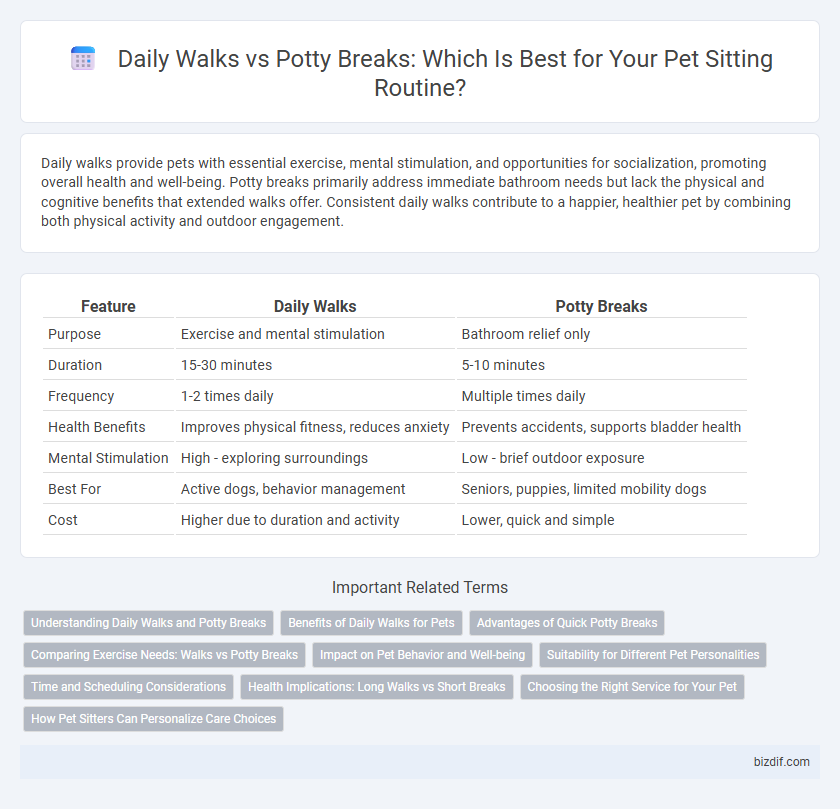Daily walks provide pets with essential exercise, mental stimulation, and opportunities for socialization, promoting overall health and well-being. Potty breaks primarily address immediate bathroom needs but lack the physical and cognitive benefits that extended walks offer. Consistent daily walks contribute to a happier, healthier pet by combining both physical activity and outdoor engagement.
Table of Comparison
| Feature | Daily Walks | Potty Breaks |
|---|---|---|
| Purpose | Exercise and mental stimulation | Bathroom relief only |
| Duration | 15-30 minutes | 5-10 minutes |
| Frequency | 1-2 times daily | Multiple times daily |
| Health Benefits | Improves physical fitness, reduces anxiety | Prevents accidents, supports bladder health |
| Mental Stimulation | High - exploring surroundings | Low - brief outdoor exposure |
| Best For | Active dogs, behavior management | Seniors, puppies, limited mobility dogs |
| Cost | Higher due to duration and activity | Lower, quick and simple |
Understanding Daily Walks and Potty Breaks
Daily walks provide essential physical exercise and mental stimulation for pets, promoting overall health and reducing behavioral issues. Potty breaks primarily serve the functional need for pets to relieve themselves, typically shorter and more frequent than walks. Understanding the difference ensures pet sitters meet both exercise and hygiene requirements, tailoring care to each pet's needs.
Benefits of Daily Walks for Pets
Daily walks provide pets with essential physical exercise that enhances cardiovascular health and helps maintain a healthy weight. These outings also offer critical mental stimulation by exposing pets to new scents, sights, and social interactions, reducing anxiety and destructive behaviors. Regular walks strengthen the bond between pet and owner while promoting overall well-being beyond the limited relief of brief potty breaks.
Advantages of Quick Potty Breaks
Quick potty breaks offer numerous advantages for pet sitting, including minimizing stress for pets by providing immediate relief and maintaining house training consistency. These short breaks ensure pets stay comfortable without the extended physical exertion of daily walks, which is especially beneficial for older or less active animals. Potty breaks also allow sitters to efficiently manage multiple pets while addressing essential bathroom needs promptly.
Comparing Exercise Needs: Walks vs Potty Breaks
Daily walks provide essential exercise that supports a dog's cardiovascular health, muscle tone, and mental stimulation, whereas potty breaks primarily serve to meet immediate bathroom needs with minimal physical activity. Dogs require at least 30 minutes to 2 hours of moderate exercise daily depending on breed, age, and energy levels, which cannot be fulfilled through short potty breaks alone. Consistent daily walks reduce behavioral issues and promote overall well-being, making them integral to effective pet sitting and care routines.
Impact on Pet Behavior and Well-being
Daily walks provide essential physical exercise and mental stimulation, significantly improving a pet's overall behavior and reducing anxiety or destructive tendencies. Potty breaks primarily serve hygiene needs and offer limited engagement, potentially leading to boredom or restlessness if used as the sole outdoor activity. Consistent daily walks contribute to a balanced mood, better socialization skills, and enhanced well-being compared to brief potty breaks alone.
Suitability for Different Pet Personalities
Daily walks offer extensive exercise and mental stimulation, ideal for active and social dogs who thrive on exploration and interaction. Potty breaks suit more reserved or elderly pets who require shorter, less strenuous outings primarily for bathroom needs. Tailoring walk duration and frequency to a pet's energy level and temperament ensures optimal physical health and emotional well-being.
Time and Scheduling Considerations
Daily walks provide essential physical exercise and mental stimulation, requiring at least 30 minutes to an hour depending on the dog's breed and energy level. Potty breaks are shorter, typically 5 to 15 minutes, and should be scheduled every 2 to 4 hours to prevent accidents and maintain routine. Efficient time management ensures pets receive adequate outdoor time while allowing sitters to balance multiple client schedules effectively.
Health Implications: Long Walks vs Short Breaks
Daily walks provide essential cardiovascular exercise that supports a dog's overall health, helping to maintain a healthy weight and improve muscle tone. In contrast, short potty breaks primarily address elimination needs but lack sufficient physical activity to prevent obesity and behavioral issues. Prioritizing long walks over solely frequent potty breaks enhances mental stimulation, reduces anxiety, and promotes better joint mobility in pets.
Choosing the Right Service for Your Pet
Daily walks provide essential physical exercise and mental stimulation for pets, promoting overall health and behavior balance. Potty breaks primarily address elimination needs, making them suitable for pets with limited mobility or shorter attention spans. Selecting the right pet sitting service depends on your pet's energy level, health requirements, and lifestyle to ensure their well-being and happiness.
How Pet Sitters Can Personalize Care Choices
Pet sitters can enhance pet well-being by tailoring daily walks and potty breaks to individual pet needs, considering factors such as breed, age, and energy levels. Personalized schedules help prevent anxiety and promote healthy routines, ensuring pets receive adequate exercise and bathroom breaks. Understanding each pet's behavior and preferences allows sitters to create a customized care plan that supports both physical health and emotional comfort.
Daily walks vs Potty breaks Infographic

 bizdif.com
bizdif.com